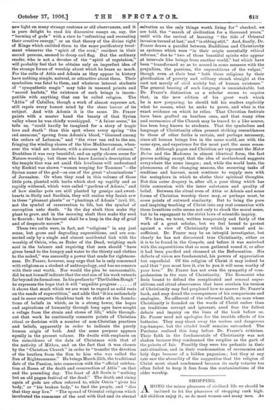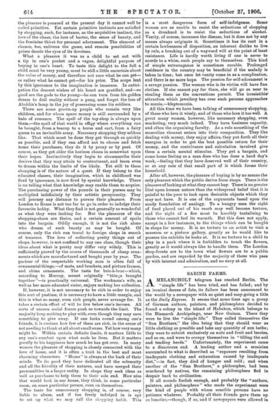SHOPPING.
AMONG the minor pleasures of civilised life we should be inclined to let the pleasures of shopping rank high. All children enjoy it; so do most women and many men. As
the pleasure is pursued at the present day it cannot well be called primitive. Yet certain primitive instincts are satisfied by shopping, such, for instance, as the acquisitive instinct, the love of the chase, the love of barter, the sense of beauty, and the feminine thirst for personal adornment. The element of chance, too, enlivens the game, and remote possibilities of prizes dazzle the eyes of its devotees.
What a pleasure it was as a child to set out with a tip in one's pocket and a vague, delightful purpose of buying in one's heart. To taste this delight to the full a child must be very young, must be still a little uncertain about the value of money, and therefore not sure what he can get— or rather what he cannot get—for his price. The scope lent by this ignorance to the imagination is immense. In antici- pation the dearest wishes of his heart are gratified, and—so good are the gods to the young—he can turn from his golden dream to dull reality without a pang, and forget the loss of Aladdin's lamp in the joy of possessing some tin soldiers. • There are some grown-up people who remain very like children, and for whom spare money is still surrounded by a halo of romance. The spell of the thy-shop is always upon them,—the spell of that world in effigy where everything can be brought, from a teacup to a horse and cart, from a fairy queen to an invincible army. Necessary shopping they seldom like. That which must be done they get through as quickly as possible, and if they can afford not to choose and fetch home their purchases, they do it by proxy or by post. Of course, as they get older the horizon closes in somewhat upon their hopes. Instinctively they begin to circumscribe their desires that they may attain to contentment, and learn even to dream within the limits of the likely. Yet still to them shopping is of the nature of a quest. If they belong to the educated classes, their imagination, which in childhood was fired by ignorance, is now fired by special knowledge. There is no telling what that knowledge may enable them to acquire. The purchasing power of the pounds in their purses may be multiplied indefinitely by their artistic perspicacity. They will journey any distance to pursue their pleasure. From London to Rome is not too far to go in order to indulge their favourite hobby. What they find is not generally so wonderful as what they were looking for. But the pleasures of the shopping-chase are theirs, and a certain amount of spoils into the bargain. Oddly enough, it is not the rich alone who dream of such beauty as may be bought. Of course, only the rich can travel to foreign shops in search of treasure. The love of collecting pretty things out of shops, however, is not confined to any one class, though their ideas about what is pretty may differ very widely. This is sufficiently proved by the scores of thousands of cheap orna- ments which are manufactured and bought year by year. The parlour of the respectable working man is often full of ornamental things,—of mats, and brackets, and picture frames, and china ornaments. The taste for bric-k-brac—which, according to Murray, meant originally "things brought together "—is practically universal. The workman's wife, as well as her more educated sister, enjoys making her collection.
If, however, it is not necessary to be rich in order to enjoy this sort of pastime, it is necessary to have a little margin, and this is what so many, even rich people, never arrange for. It takes a certain effort of will to live below one's income. All sorts of unseen social forces push us towards the limit. The majority keep nothing to play with, even though they may save something to give away. If one looks round among one's friends, it is curious how few of them are rich, in the sense of not needing to think at all about small sums. Yet how very many might be. Within certain definite limits, it matters little to any one's comfort upon what scale he lives. But it matters greatly to his happiness how much he has got over. In many women the pleasure of shopping is closely connected with the love of home, and it is often a trait in the beat and most charming characters. " Home" is always at the back of their minds. To its good they have dedicated all the solemnity and all the frivolity of their natures, and have merged their personalities in a larger entity. In shops they seek ideas as well as purchases to help them to their sole end. How nice that would look in our house, they think, in some particular room, on some particular person, even on themselves.
The taste for unnecessary shopping is, of course, very liable to abuse, and if too freely indulged in is apt to set up what we may call the shopping habit. - This
is a • most dangerous form of self-indulgence. Some women are as unable to resist the seductions of shopping as a drunkard is to resist the seductions of alcohol. Vanity, of course, increases the disease, but it does not by any means always origiqate it. Sometimes it has its root in a' certain lawlessness oi disposition, an inherent dislike to live by rule, a breaking out of a wayward will at the point of least resistance. Life is hardly worth living •if one is never to accede to a whim, such people say to themselves. This kind of simple extravagance is sometimes curable. Prolonged residence in the country may be beneficial if the malady is taken in time;. but once let vanity come in as a complication, and there is no more hope. The passion for self-adornment is a savage passion. The woman who is its victim will have fine clothes. If she cannot pay for them, she will go as near to stealing them as the conventions permit. The irresistible' attraction which jewellery has over such persons approaches to mania,—kleptomania.
All this time we have been talking of. unnecessary shopping, of those who love it wisely,. and of those who love it to well. A great many women, however, like necessary shopping, even marketing, very much indeed. They have business capacity, and often the organising faculty. • As a rule 'something of the masculine element enters into their composition. They like dealing with money, they enjoy affairs, they put forth all their energies in order to get the best possible return for their money, and the contrivance and. calculation involved give them a certain mental stimulus. They get a bargain, and come home feeling as a man does who has done a hard day's work,--feeling that they have deserved well of their country, or at any rate of that small part of it which forms their household.
After all, however, the pleasure of buying is by no means the only pleasure which the public derive from shops. There is the pleasure of looking at what they cannot buy. There is no greater libel upon human nature than the widespread belief that it is painful to the poor to look upon desirable objects which they may not have. It is one of the arguments based upon the sandy foundation' of analogy. To a hungry man the sight of food placed out of his reach may well become torture, and the sight of a fire must be horribly tantalising to those who cannot feel its warmth. But this does not apply, except in a few instances, to the things which can be bought. in shops for money. It is no torture to an artist to visit a museum or a picture gallery, greatly as he would like to• possess the exhibits he looks at. It is no torture to a child to play in a park where it is forbidden to touch the flowers, greatly as it would always like to handle them. The London shop-fronts are to the town what flowers are to a public garden, and are regarded by the majority of those who pass
by with interest and admiration, and no envy at all. •















































 Previous page
Previous page